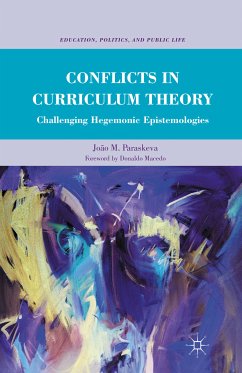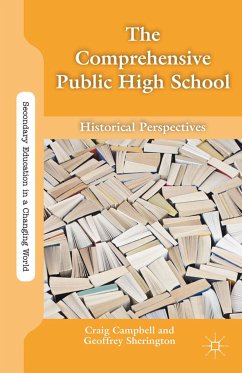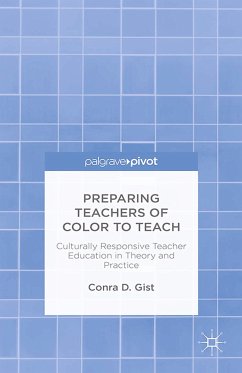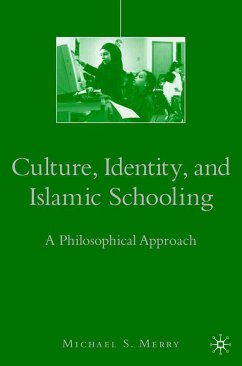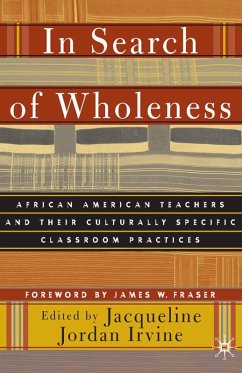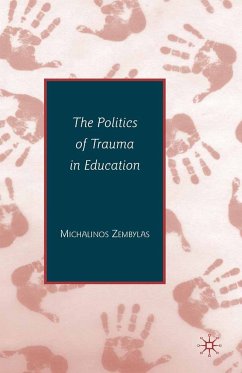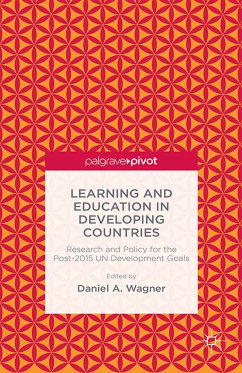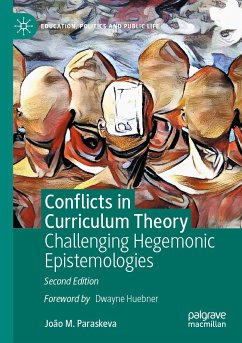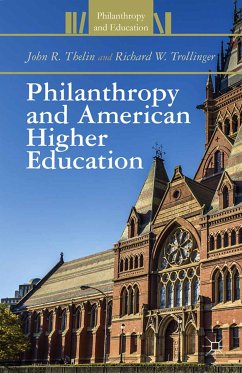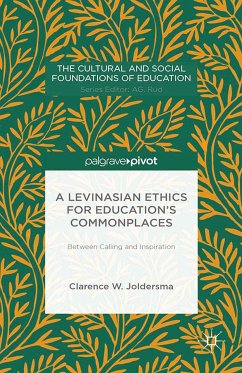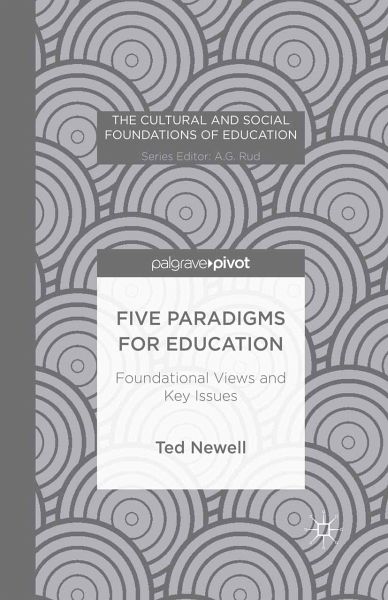

PAYBACK Punkte
26 °P sammeln!






Newell compares the fundamental assumptions of five major worldviews of education and their implications for classroom practice, incorporating history and case studies and posing questions about the limits and benefits of employing each today.
Dieser Download kann aus rechtlichen Gründen nur mit Rechnungsadresse in A, B, BG, CY, CZ, D, DK, EW, E, FIN, F, GR, HR, H, IRL, I, LT, L, LR, M, NL, PL, P, R, S, SLO, SK ausgeliefert werden.
Ted Newell is Associate Professor, Education at Crandall University, Canada.
Produktdetails
- Verlag: Palgrave Macmillan US
- Seitenzahl: 159
- Erscheinungstermin: 20. November 2014
- Englisch
- ISBN-13: 9781137391803
- Artikelnr.: 46753996
"This is a wonderfully clear introduction to some of the most powerful ideas that have shaped education today. It is written in an engaging and inviting style, which encourages readers to analyze and synthesize for themselves the ideas that form the major paradigms of educational thought. It is additionally valuable because it brings into reflection on current educational issues unexpected insights from, among others, Mende thinking as well as the more familiar Rousseau, from ancient Israeli thinking as well as Plato, from Jesus as well as Homer, broadening and deepening conversations about what we should do in everyday classrooms. A great text for pre-service teachers, as well as other educators. Neat, clear, engaging, helpful." - Kieran
Mehr anzeigen
Egan, Simon Fraser University, Canada
Ted Newell presents an informative and engaging account of five major forms - paradigms - of education in western history. He relates these to important issues in contemporary education. He demonstrates that all forms of education, however different they may otherwise be, rest upon underlying, fundamental assumptions about the world and human life. These assumptions are at bottom essentially philosophical and religious. The reader is challenged and given important help in being able to bring to light to and evaluate the basic religious-philosophical assumptions - often hidden - to be found at the heart of every form and practice of education today.
- Douglas M. Sloan, Professor of History and Education Emeritus, Teachers College, Columbia University, author of Faith and Knowledge.
"The best teachers do what they do well . . . and know why they do it. The fundamental aims of education continue to be hotly disputed, and Ted Newell offers pre-service teachers a superb overview of the key issues. He presents five paradigms of education, including those of Plato, Locke, Rousseau and Jesus, and invites his readers to assess their relative strengths and weakness before applying them to their own teaching. According to Whitehead 'it is the essence of education that it be religious'. Newell draws on Whitehead, not in a narrowly confessional manner, but in expansive spiritual manner designed to enable students to make sense of their lives, not just in relation to other people and society at large, but also in terms of their place in the cosmos as a whole. His underlying message is that education has the potential to transform students for the better, and that good teachers do so by focusing on what is really important. Five Paradigms for Education is essential reading for pre-service teachers: challenging yet accessible, provocative yet level headed, and with the potential to irrevocably transform their understanding of what is means to be a good teacher." - Andrew Wright, Professor of Religious and Theological Education, Kings College London, UK, and author of Critical Religious Education: Multiculturalism and the Pursuit of Truth (2007)
"Beginning with the proposition that educating is spiritual or religious work via Whitehead, Newell insightfully and analytically compares five mayor paradigms of education with fruitful results. The five paradigms are traditional, Plato's, Locke's, Rousseau's, and Jesus' and Newell deepens our understanding and practice by exploring the facets of each paradigm. Perennial educational questions are well identified and here is choice reading for all those engaged in education of any form that includes scholar, teacher and student alike." - Robert Pazmiño, Valeria Stone Professor of Christian Education, Andover Newton Theological School, USA
"Working from Whitehead's aphorism that the essence of education is religious, Newell helps advance an important conversation about five major ways people understand education. He does so by giving his readers a framework to think about how these five perspectives shape various societies' educational ideals and how they influence the day-to-day work of teachers. In each case whether about traditional societies, Plato, empiricism, Rousseau, or Jesus he also gives his readers enough clear information to identify what philosophic wells they themselves drink from in their educational practice." - Ken Badley, Director of Doctoral Studies, George Fox University, USA
Ted Newell presents an informative and engaging account of five major forms - paradigms - of education in western history. He relates these to important issues in contemporary education. He demonstrates that all forms of education, however different they may otherwise be, rest upon underlying, fundamental assumptions about the world and human life. These assumptions are at bottom essentially philosophical and religious. The reader is challenged and given important help in being able to bring to light to and evaluate the basic religious-philosophical assumptions - often hidden - to be found at the heart of every form and practice of education today.
- Douglas M. Sloan, Professor of History and Education Emeritus, Teachers College, Columbia University, author of Faith and Knowledge.
"The best teachers do what they do well . . . and know why they do it. The fundamental aims of education continue to be hotly disputed, and Ted Newell offers pre-service teachers a superb overview of the key issues. He presents five paradigms of education, including those of Plato, Locke, Rousseau and Jesus, and invites his readers to assess their relative strengths and weakness before applying them to their own teaching. According to Whitehead 'it is the essence of education that it be religious'. Newell draws on Whitehead, not in a narrowly confessional manner, but in expansive spiritual manner designed to enable students to make sense of their lives, not just in relation to other people and society at large, but also in terms of their place in the cosmos as a whole. His underlying message is that education has the potential to transform students for the better, and that good teachers do so by focusing on what is really important. Five Paradigms for Education is essential reading for pre-service teachers: challenging yet accessible, provocative yet level headed, and with the potential to irrevocably transform their understanding of what is means to be a good teacher." - Andrew Wright, Professor of Religious and Theological Education, Kings College London, UK, and author of Critical Religious Education: Multiculturalism and the Pursuit of Truth (2007)
"Beginning with the proposition that educating is spiritual or religious work via Whitehead, Newell insightfully and analytically compares five mayor paradigms of education with fruitful results. The five paradigms are traditional, Plato's, Locke's, Rousseau's, and Jesus' and Newell deepens our understanding and practice by exploring the facets of each paradigm. Perennial educational questions are well identified and here is choice reading for all those engaged in education of any form that includes scholar, teacher and student alike." - Robert Pazmiño, Valeria Stone Professor of Christian Education, Andover Newton Theological School, USA
"Working from Whitehead's aphorism that the essence of education is religious, Newell helps advance an important conversation about five major ways people understand education. He does so by giving his readers a framework to think about how these five perspectives shape various societies' educational ideals and how they influence the day-to-day work of teachers. In each case whether about traditional societies, Plato, empiricism, Rousseau, or Jesus he also gives his readers enough clear information to identify what philosophic wells they themselves drink from in their educational practice." - Ken Badley, Director of Doctoral Studies, George Fox University, USA
Schließen
Für dieses Produkt wurde noch keine Bewertung abgegeben. Wir würden uns sehr freuen, wenn du die erste Bewertung schreibst!
Eine Bewertung schreiben
Eine Bewertung schreiben
Andere Kunden interessierten sich für


